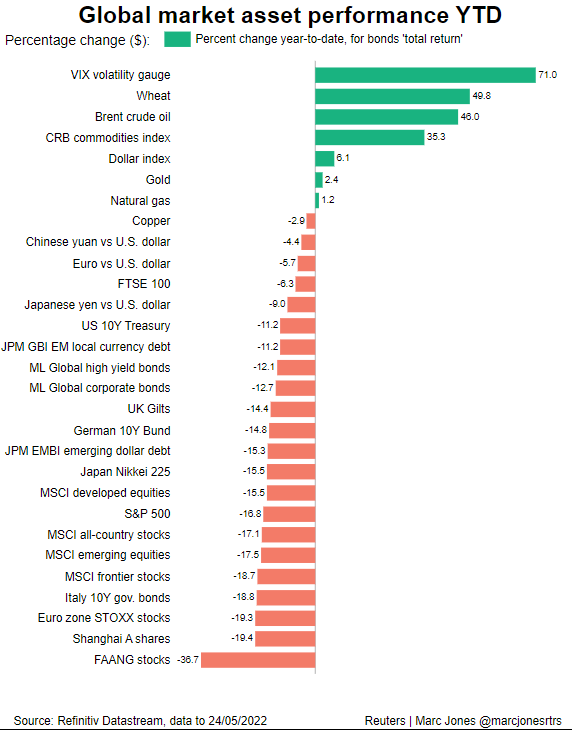Global Shares Rise Ahead Of Fed Minutes

Stock markets rose and benchmark U.S. treasury yields fell on Wednesday as traders waited for news from the U.S. Federal Reserve - the world's most influential central bank - that might shed light on the path of its policy tightening.
Nerves about a global recession were jangled on Tuesday by weak U.S. housing market data, but the mood gradually strengthened in global markets.
Hints of more stimulus from China and a welcome tick up in German consumer morale lifted Europe's STOXX 600 0.72%, and MSCI's gauge of stocks across the globe gained 0.42% at 10:50 a.m. EDT (1450 GMT). [.EU]
On Wall Street, the Dow Jones Industrial Average rose 114.28 points, or 0.36%, the S&P 500 gained 21.05 points, or 0.53%, and the Nasdaq Composite added 88.10 points, or 0.78%, as growth stocks rallied.
The U.S. Federal Reserve has vowed to act aggressively by hiking the cost of borrowing. Minutes from its most recent meeting, due at 2 p.m. EDT (1800 GMT), will be parsed for clues regarding the speed and extent of those actions. [.N]
Investors currently expect a series of 50 basis-point rate hikes over the next several months, stoking fears that it could easily bring the world's largest economy to a standstill.
Nicholas Colas, cofounder of DataTrek Research, said the U.S. markets, which have recently been volatile, will bottom once the Fed indicates inflation has started to ease.
"The Fed is using stock prices as a primary tool in their fight against inflation," Colas wrote in a note Wednesday. "Lower stock prices tell companies to stop hiring so aggressively and feeding wage inflation. They also create a reverse wealth effect, which should curtail consumer spending."
The U.S. dollar index - which measures the currency against six major rivals - snapped a two-day losing streak to rise 0.413%, with the euro down 0.54% at $1.0676. [/FRX]
The Reserve Bank of New Zealand became the latest central bank to raise interest rates by half a point.
That had helped the kiwi dollar rise as much as 0.8% at one point to a three-week peak of $0.6514. But as the U.S. dollar gained momentum, it ceded those gains and by 1300 GMT traded flat at $0.6458.
The other big mover was Turkey's lira < TRYTOM=D3>, which having already plunged 8% this month and 19% this year, looked to be causing another serious bout of trouble for the country.
Bond markets were largely in a holding pattern, meanwhile, ahead of the Fed minutes, and after ECB chief Christine Lagarde gave her strongest hint yet this week that it will soon deliver its first interest rate hikes in over a decade.
Graphic: Global markets in 2022 -

DISLOCATION
New home sales in the United States fell 16.6% month-on-month in April, the largest decline in nine years, and new orders for U.S.-made capital goods rose less than expected in April.
The drop in capital goods orders pointed to some moderation in business spending on equipment early in the second quarter, and headwinds are growing from rising interest rates and tightening financial conditions.
Benchmark U.S. Treasury yields fell on Wednesday to briefly hit six-week lows. The benchmark 10-year note dipped to 2.7488% from over 3% earlier in the month. The 2-year U.S. yield was 2.4879% and 10-year German Bund yields were down at 0.917%.
ECB Executive Board member Fabio Panetta fanned the moves as he said stimulus needed to be curbed gradually to avoid what he described as a "normalization tantrum" by markets.
Colin Asher, a senior economist at Mizuho, said the drop in bond yields in recent weeks showed how concerns about a global slowdown are now rising.
"In the first few months of the year, the focus was on surging inflation and now it's more of stagflation," he said, referring to the mix of no growth but still-high inflation.
Investors in Asia had remained similarly nervous about growth being impacted by the effects of persistent Chinese COVID-19 lockdowns, which threaten to undermine recent stimulus measures in the world's second-largest economy.
Emerging market stocks rose 0.19%. MSCI's broadest index of Asia-Pacific shares outside Japan closed 0.25% higher, while Japan's Nikkei lost 0.26%. Australian and Korean shares rose 0.4% and Taiwan and Hong Kong's Hang Seng advanced 0.8% and 0.2% respectively.
Among the main commodities, spot gold dropped 0.8% to $1,850.34 an ounce. U.S. crude recently rose 0.76% to $110.60 per barrel and Brent was at $114.33, up 0.68% on the day.
© Copyright Thomson Reuters 2024. All rights reserved.



















